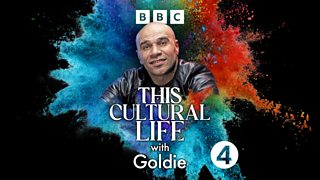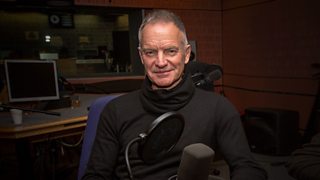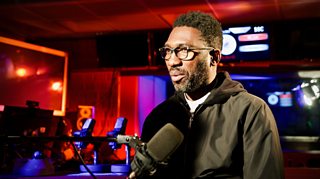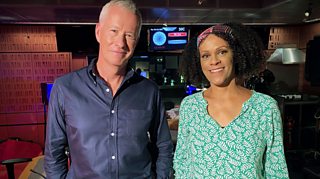Goldie: Nine things we learned from his This Cultural Life interview
The musician, artist and occasional actor Goldie has been a pioneering contributor to British culture since the 1990s. In this episode of This Cultural Life, he has a very honest and moving talk with interviewer John Wilson about his abusive childhood, how he turned that childhood pain into music, and working with his hero David Bowie. Here are nine things we learned.

1. Goldie was taken into care when he was three
“I remember a car pulling up… and they said, ‘You have to go now with this lady.’"Goldie
Born Clifford Joseph Price in 1965, Goldie had a very difficult childhood. “My father wasn’t really around,” he says. “He was this dark figure who would come and go.” For the first few years of his life he was raised by his mum, a pub singer, but was taken into care at the age of three. “I remember a car pulling up… and they said, ‘You have to go now with this lady.’ I got into the car and I remember looking out of the window and seeing my brother just standing there, not even waving.” He moved between foster homes and children’s homes throughout his childhood.
2. He suffered abuse through his childhood
Goldie describes “a lot of bullying” in his children’s homes and “in the first foster home, and the second, a lot of sexual abuse. I was very young. I was about seven then. I can remember it all.” He speaks of a teenage girl who sexually abused him and a photo he remembers of them on holiday together, with him smiling broadly. “I had happy moments, because that’s how abuse works,” he says. “You don’t understand what it is. It’s not wrong at that point. The shame didn’t come until after, and you start to realise what it is.”
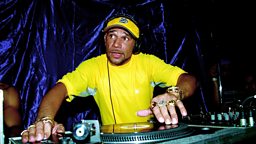
3. Breakdancing and graffiti changed his life
When he was a teenager, Goldie ran away from a children’s home to go and find his mother and brother in Wolverhampton. He said he was initially “robbing all the time”, but then he discovered breakdancing. “It was the biggest escape,” he says. He and friends would pass around videos of breakdancers from New York. His love of breakdancing led to a love of graffiti art, which he enjoyed because it helped him make his mark. “I wanted to be a graffiti writer and I wanted to be known. I wanted everyone to know my name.” He became quite renowned as a graffiti artist, with shows dedicated to his work, and still loves it now. “Graffiti won,” he says. “Take away graffiti on your daily travels and you’re gonna say something’s really missing… We’ve been on the longest road with [acceptance of graffiti]. Culture takes time. Now it’s part of the woodwork.”
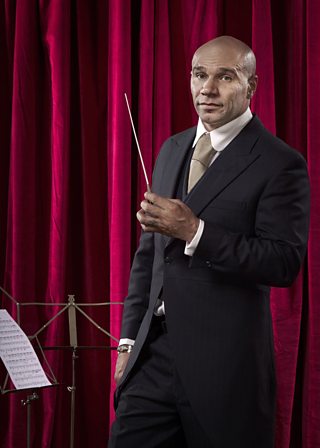
4. The name Goldie has nothing to do with his teeth
Goldie is famous for his gleaming gold teeth. You might assume that’s how he got his nickname, but that was actually down to his hair. “My hair was quite light and [worn in ‘locs’], so they called me Goldilocks,” he says. “Then the breakdancing came and I cut the locs off, so I just became Goldie.” The teeth came much later, when he was in Miami. He was there visiting his father for the first time, when he was 21, and he got the gold teeth because “everyone had gold caps in Miami”.
5. Jazz led him to a music career
“Nobody would ever associate me with Pat Metheny,” says Goldie. Yet he calls the jazz guitarist the man who inspired him to make music. He was staying with his dad in Miami when he discovered Metheny. “I was lying in the front room in my father’s home [watching the jazz channel]… and all of a sudden Pat Metheny pops up with this sound that was so unique. I always remember the track that really blew my mind was Minuano from the album Still Life (Talking). It was this space in the sound… It provoked in me a want to make music.”
6. He sees sound in colours
Goldie tells John about the way he “sees” music, which has colours to him. “I’ve always visualised music and I see the sound,” he says. “I can see the purples of the basses, and the blues, and the oranges of the strings. The top lines are the yellows and the limes. I can see it.”
7. He wrote a song for David Bowie after a week-long bender
Goldie remembers hearing David Bowie’s Space Oddity as a child and “he just blew me away. It was just so different.” He later realised he related deeply to Bowie’s recurring theme of space, a metaphor for abandonment. “Abandonment issues have cost me everything,” he says. After the release of Timeless he got a fax from Bowie’s representative. “He said Bowie wants to meet up. Wow!” Bowie recorded vocals for the track Truth, which Goldie recorded when not in the best shape. “I’d been on a week’s bender, the maddest bender in a very long time,” he says. “I remember waking up… and I’d written this poem, which was insane. It was called Letter Of Fate. I thought, ‘This is going to be the Bowie song.’ It’s gonna be a ballad. I sent it to Bowie and he liked it.”
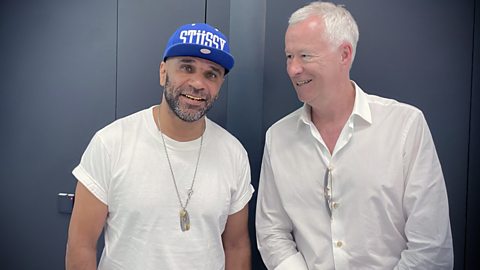
"She whispered in my ear, 'Just play it for me when I die.'"
Goldie on This Cultural Life.
8. His most famous work is a message to his mum
The only way I could communicate with her was the way I know best, through music. When she heard it, she cried her eyes out.Goldie
The two most famous works from Goldie’s music career are Inner City Life, from his first album, Timeless, and Mother, an hour-long composition from his second album, Saturnz Return. The latter was his way of communicating his complex relationship with his mother. “It was my lamenting for her,” he says. It was inspired by the work of composer Henryk Górecki. “I was introduced to Górecki by Björk, who was a massive fan… I always thought classical music was pots and pans… but it resonated with me.” It moved him to make Mother, which he played to his own mother when she was dying. They re-established contact in the late 90s. “I was so angry and this small boy’s voice in my head said, ‘You’ve got no peace with your mother. You need to reconcile.’ The only way I could communicate with her was the way I know best, through music. When she heard it, she cried her eyes out. She was in bits. We hugged and she whispered in my ear, ‘Just play it for me when I die.’”
9. He wants to become a filmmaker
At 56, Goldie feels “my greatest work is coming.” He hopes to make a film. “I will make my opus. I want to direct my life story in the way that it is. Just want to tick that last box and get it over the line. I believe that my healing is going to come by calling ‘Action!’”
More from ���˿��� Radio 4
-
![]()
Sting: Nine things we learned from his This Cultural Life interview
The legendary musician talks about the experiences and influences that shaped his songwriting career.
-
![]()
Kwame Kwei-Armah: Nine things we learned from his This Cultural Life interview
John Wilson speaks to the Artistic Director of The Young Vic theatre.
-
![]()
Bernardine Evaristo: Nine things we learned from her This Cultural Life interview
The Booker Prize winner on overcoming bad relationships and her key technique for success.
-
![]()
Eight things we learned from Jarvis Cocker on This Cultural Life
Jarvis discusses his iconic glasses, Shakespeare and why he cried over an ancient horse.
